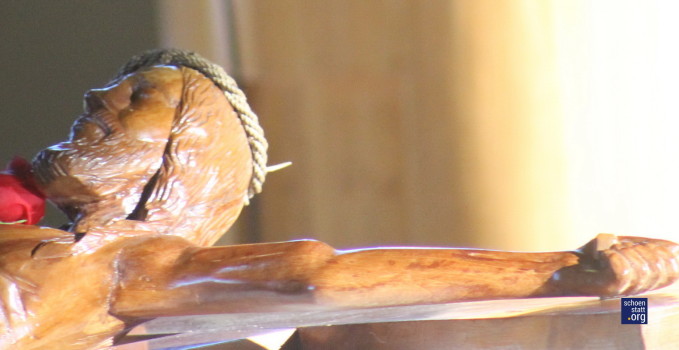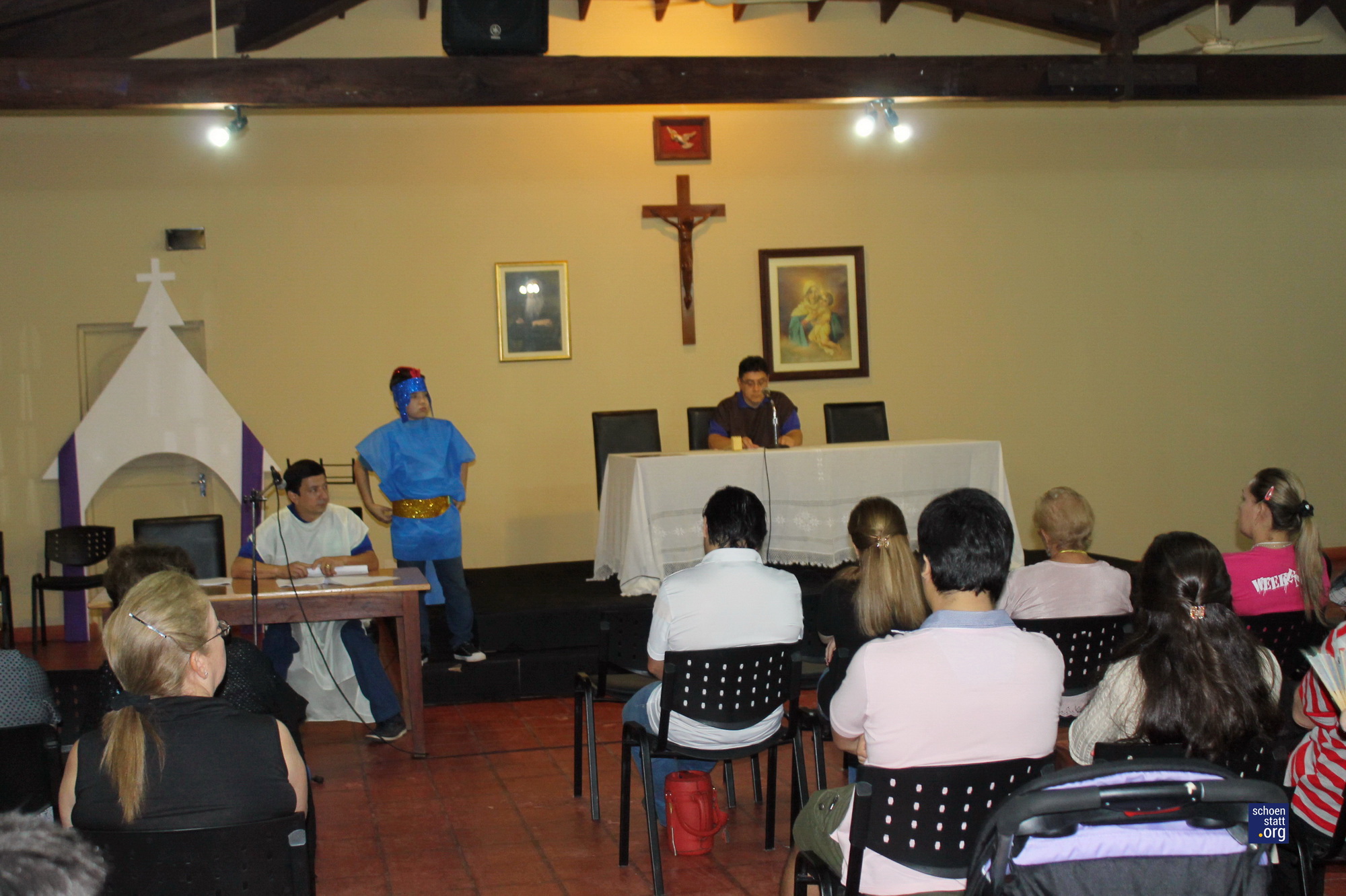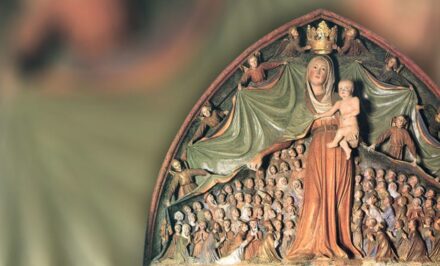A reflection for Holy Week in the form of a trial. By Diana and Alejandro Caballero with the Retreat for Holy Week Team at Tuparenda •
It was one of the milestones of the 2015 Holy Week Retreat at Tuparenda. In the form of a trial- with the participants as jurors, where the alleged perpetrators of Jesus’ death were processed one after another. It motivated those participating to reflect today where Jesus is killed through fear, the search for power, because of envy, cowardice, apathy, lack of time…Jesus, who “In every age and on many different paths you stagger, scorned and laden with the cross,” (Heavenwards, p. 64) in the poor, the marginalized, prisoners, refugees, the children without access to schooling, the ill, the elderly, the homeless…and so many more and not so far away.
Here we publish what the first accuser, Pontius Pilate said. How would we answer the lawyer’s questions?
It is an invitation to live Holy Week in a personal way, to sing the Easter Alleluia with a renewed heart – since Jesus always forgives. His forgiveness is our Easter.
1 – PONTIUS PILATE’S TRIAL
JUDGE: We just witnessed the death of Jesus Christ, undoubtedly the most famous death of history. As you have seen, Christ’s death was not a clandestine assassination committed in the darkness of the night; but rather, it was the result of a court ruling pronounced in a court of law. The execution occurred on a Friday at noon. The accused died three hours later. Well, what is of interest now is WHO KILLED HIM? Who is to blame for his death? Since it was a court decision we cannot blame the executioners, or that is, those who physically nailed the accused to the wooden cross where he later died. It is very evident that others were to blame. So, to better judge what happened, we are going to call the main characters that had something to do with the death of Jesus of Nazareth once again. You are going to be the jury. In each case, you will say if he is guilty or not, after hearing his defense, according to the prosecutor’s accusations. I warn you that you should not be influenced by any kinship you may have with the accused, be guided only by the love for the truth.
Finally, I inform you that your silence will be interpreted as an accusation of guilt. It is impossible to be neutral before an event of such great importance like that of the crucifixion of the Son of God. As Judge, I will accept the judgment , the decision of the jury, without discussion. Understood?
Thus, (he taps the table twice) the session begins. They called the first accused: Pontius Pilate!
GUARD: (Says in a loud voice) Pontius Pilate!
JUDGE: You have the floor Mr. Prosecutor.
PROSECUTOR: (Addressing Mr. Judge) Thank you, your Honor. (Now addressing Pilate) State your full name.
PILATE: Pontius Pilate.
PROSECUTOR: Mr. Pontius Pilate, were you the highest political authority in the country of Judea during the time of the crucifixion of Jesus of Nazareth?
PILATE: Yes, that is true, although I only represented the Roman Emperor.
PROSECUTOR: Judea, was it a colony of the Roman Empire?
PILATE: Yes, it was one of the most miserable and disgusting ones. The Jews were always fighting among themselves…Pharisees, Sadducees and those Zealot warriors. I never wanted to be sent there.
PROSECUTOR: Correct. However, you had political responsibility and it was you who condemned Jesus to death.
PILATE: No, I did not do that. I publically washed my hands of the matter. I knew he was innocent, and I did whatever was possible to save him. Since it was a custom to release a prisoner on the feast of Easter, I even let the Jews choose between Jesus and Barabbas. And what happened? They chose freedom for that criminal, Barabbas.
And when I told them that Jesus was innocent. They shouted at me: “Crucify him! Crucify him!.” Some wanted to blackmail me, the scoundrels said: “If you release him, we will accuse your before the Roman Emperor.”
PROSECUTOR: But you condemned him?
PILATE: What else could I do. Those Jews had me cornered.
PROSECUTOR: However, it is true that in all the country, only you had the power to condemn a man to death.
PILATE: Yes, that is true.
PROSECUTOR: And if you had not given your consent. Jesus would not have died.
PILATE: (Very angry and with an agitated voice) I deny it! Those accursed Pharisees would have assassinated him clandestinely. I did it in a legal way, nothing more…
PROSECUTOR: That is all your Honor, thank you.
JUDGE: The defense attorney has the floor.
COUNSEL:
DEFENSOR:
(Addressing Pilate)
Is it true that you were the representative of the Roman Empire?
PILATE: Yes, that is true!
COUNSEL: You were a representative of the Roman Empire; one of your primary functions was that of maintaining order so that it would not be disrupted by popular uprisings, by guerrillas by assemblies, by meetings…is that true?
PILATE: Yes, that is true. Rome did not want the peace in its colonies to be disrupted. We had orders to suppress, any manifestation that would cause popular disorders, by force…
COUNSEL: Good. On the other hand isn’t it true that the Roman Empire was interested in having good relations with the religious authorities of Judea?
PILATE: Yes, it is true. Rome had recommended that we maintain cordial relations with the High Priests. We had secret agreements and concessions that I confess, were sometimes against the people’s interest.
COUNSEL: You were pressured by Annas and Caiaphas to dictate the death sentence of Jesus of Nazareth?
PILATE: That is how it was! They pressured me strongly; they even threatened to send emissaries to Rome showing my disloyalty to the Empire; that, logically would provoke my removal from office, perhaps my prosecution and my political ruin.
COUNSEL: (Addressing the jury: the public) Gentlemen of the jury! This man is innocent. He acted under very strong pressures…Wouldn’t any of you felt fear if you were accused by a prosecutor of justice? The fear of losing your job, what your family or children would think, doesn’t that oblige us to remain silent before the injustices that we see? Gentlemen of the jury, if you condemn this man, you are condemning yourselves… Isn’t it true that one fears an accusation and upon demanding your rights in the neighborhood, at work, at the university…” Having you washed your hands many times before the flagrant injustices that are committed around you and in front of you:
the displaced, repressions, harassment, mistreatment, labor exploitation, discrimination of social classes, etcetera? On all these occasions, your definition would be necessary to be in solidarity with others; but…the risks are too great and we prefer to do nothing: exactly like Pilate, whom you are now going to judge.
(Addressing the Judge) I have finished your Honor.
JUDGE: Thank you. Now to the people, as jury, you will have the last word.
(Addressing the public)
If someone in the public wants to question the accused, you may do it now…
JUDGE: Then, we proceed with the judgment.
(Addressing the public) Everyone who thinks that Pontius Pilate is INNOCENT of Jesus’ death raise your hand. Remember that those who abstain from voting are voting against the accused.
Guards, count the votes.
Now, those who consider that Pontius Pilate is GUILTY of the aforementioned crime raise your hand.
Guards, count the votes.
JUDGE: The prisoner, Pontius Pilate, has been declared GUILTY by popular and democratic vote by this tribunal of the people, consequently, he is condemned to death on the cross. Take him. (The guards capture him and take him away).
OR
The prisoner, Pontius Pilate, has been declared INNOCENT by popular and democratic vote by this tribunal of the people, consequently, he will be released at this moment. He is free. (He leaves freely).
Complete Script of “Who killed Jesus?” (Spanish)















